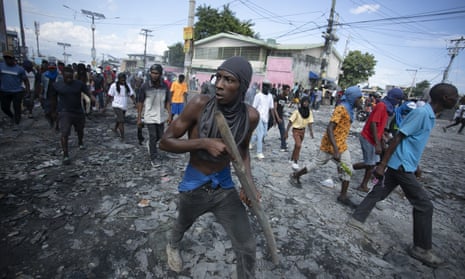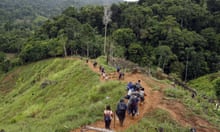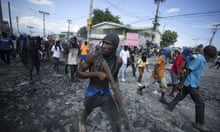Earlier this week, the terms of Haiti’s last 10 remaining senators officially expired, leaving the Caribbean country without a single elected government official as it faces a set of intersecting catastrophes: famine, cholera, devastating gang violence, fuel shortages and economic collapse.
“The situation is unprecedented in Haiti’s history,” Prof Matthew Smith, a historian of Haiti who joined UCL in London as director of the Centre for the Study of the Legacies of British Slavery after many years at the University of West Indies. “You could see the country’s history as a series of crises with brief periods of hope and peace – but there hasn’t been anything like this.”
How did Haiti get here?
The country has been in a state of electoral and constitutional turmoil since the assassination of the president, Jovenel Moïse, in 2021 at the hands of Colombian mercenaries with unknown paymasters, but the immediate crisis can be traced back further.
Haiti has not held functional elections since 2019 – and the country has been in a fragile state since the 2010 earthquake that killed up to 300,000 people. But Moïse’s death in July 2021 – and a new earthquake the following month – sent the situation spiralling out of control.
Moïse was replaced by an acting president, Ariel Henry, who is unelected and widely viewed as illegitimate. In September, the G9 gang coalition blockaded the main port and fuel terminal after Henry caused fuel prices to double when he announced a cut to fuel subsidies – a development that brought the crisis to new heights. Haiti is now experiencing its worst-ever famine, with 4.7 million people facing acute hunger.
At the same time it is impossible to understand the current situation without acknowledging the dark history of international interventions, including US occupation from 1915-1934, that have blighted Haiti. “Those interventions have shaped Haiti,” Smith said. “There’s a chain-link connection.”
Long before the litany of recent disasters, he said, “the Duvalier dictatorship [the rule of father and son François, or “Papa Doc”, and Jean-Claude, or “Baby Doc”, Duvalier from 1957-1986] destroyed the hopes of a functioning state that serves the nation..”
There is an even deeper history. For generations after independence in 1804, Haiti was saddled with the impact of “reparations” to France – the country that enslaved its people – in some years spending 40% of government revenue on its resulting debts. That burden severely hampered economic growth and the development of robust public services.
What are the consequences of the power vacuum?
In the absence of a functioning state, gangs have filled the void. Port-au-Prince is the centre of a horrific turf war in which there have been prolific kidnappings, many civilian deaths, and gang-rape of elderly people and children, a UN report says.
Gangs have a longstanding role in political life, and have operated in tandem with political actors since the 1950s to intimidate rivals and deliver votes. There are suggestions of oligarchic figures with ties to the drugs trade pulling the strings – but “many of them are not affiliated to anybody”, Smith said.
“The international drug trade is a very important part of it, but that was only the beginning. Now gangs have secured their power locally, it is very hard to see that any more powerful actor can control them. The situation has dissolved into the incomprehensible.”
What impact are the gangs having?
There are almost 100 gangs in Port-au-Prince, many of them in loose alliances at war with rival groups. Gangs control major roads and draw income from customs, water and electricity distribution, and even bus services. Membership has become so desirable for some young men that some gangs now have waiting lists for new recruits (pdf).
after newsletter promotion
The country’s army – disbanded in 1995 after years of military interference in politics – has been reestablished but stands at just 500 soldiers, while police also appear impotent.
The ongoing violence has forced the closure of hospitals and has been blamed in part for the re-emergence of cholera, as well as fuel shortages that only worsen the crisis. Last month, the UN estimated 155,000 people had fled their homes – almost one in six of the city’s population.
Is there a way out of the crisis?
Arguably the two most important steps for the restoration of order are ending the gangs’ power and holding meaningful new elections. Both seem a distant prospect.
One suggestion is the deployment of international forces, an idea that has Henry’s support. Joe Biden and Justin Trudeau discussed the prospect of a Canadian-led force at a summit on Tuesday, with the US reluctant to send troops itself.
There is some support in Haiti for such an idea but critics say it could simply escalate the violence. Trudeau appeared cautious about the proposal, although Canada did send armoured vehicles for the police to use.
Smith said he was deeply torn about the arrival of foreign troops. “For it to work meaningfully, it would have to be working with a very limited, clear definition of security, or it becomes occupation,” he said. “[They] would need to work with civil society groups on the ground before any force arrived.”
Meanwhile, as long as Henry’s power remains unchecked, opposition leaders appear uninterested in agreeing a timetable for new elections. With an intransigent leader and foreign intervention such a vexed question, it is hard to see Haiti beginning to emerge from crisis any time soon.








